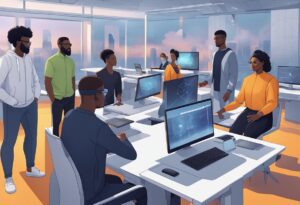Metaverse apprenticeships are an innovative way for individuals to gain valuable skills and experience in the rapidly growing field of technology. These apprenticeships provide an alternative to traditional university education and allow individuals to earn while they learn. With the rise of the metaverse, there is a growing need for skilled professionals who can help build and maintain these virtual worlds. In this blog post we will discuss metaverse apprenticeship and provide with a list of the top 10 metaverse apprenticeship programs to join.
Through metaverse apprenticeships, individuals can gain hands-on experience working with cutting-edge technology and innovation. These programs offer a unique opportunity to develop skills in areas such as software engineering, data analytics, and IT support. Apprenticeships provide access to a global community of industry experts, offering invaluable networking opportunities and mentorship.
As the metaverse continues to expand and evolve, the demand for skilled professionals will only continue to grow. Metaverse apprenticeships offer a pathway for individuals to gain the skills and experience needed to succeed in this exciting and rapidly changing field. With opportunities available around the globe, these apprenticeships offer a truly global perspective on technology and innovation.
Understanding the Metaverse
The Metaverse is a term used to describe a virtual universe or a network of interconnected virtual worlds that enable users to interact with each other and with digital objects in a shared space. It is a concept that has been around for decades and has been popularized in science fiction literature and movies. The Metaverse is seen as the next iteration of the internet and is expected to revolutionize the way we interact with each other and with technology.
Technologies Behind the Metaverse
The Metaverse is made possible by a combination of technologies, including virtual reality (VR), augmented reality (AR), artificial intelligence (AI), and blockchain. VR and AR technologies enable users to immerse themselves in virtual environments and interact with digital objects as if they were real.
AI is used to create intelligent agents that can interact with users and perform tasks in the virtual world. Blockchain technology is used to create a decentralized and secure environment for transactions and ownership of digital assets.
The Role of VR and AR in Metaverse
VR and AR technologies are crucial for the development of the Metaverse. VR enables users to fully immerse themselves in a virtual world and interact with other users and digital objects in a natural and intuitive way. AR, on the other hand, overlays digital information onto the real world, allowing users to interact with digital objects in a real-world context.
The combination of VR and AR technologies enables the creation of a seamless and immersive virtual environment that can be used for a wide range of applications, including education, entertainment, and business.
The Metaverse is an exciting concept that has the potential to revolutionize the way we interact with each other and with technology. The combination of VR, AR, AI, and blockchain technologies enables the creation of a seamless and immersive virtual environment that can be used for a wide range of applications.
The development of the Metaverse is still in its early stages, but it is expected to grow rapidly in the coming years, creating new opportunities for businesses, developers, and users alike.
Metaverse Apprenticeship Programs

The metaverse is a virtual reality world that has the potential to revolutionize the way we work, live and play. As such, it presents a unique opportunity for individuals to develop their skills and build a career in this exciting field. Metaverse apprenticeship programs offer a structured way for individuals to gain the necessary skills and experience to succeed in this emerging industry.
Benefits of Apprenticeships in the Metaverse
Apprenticeships in the metaverse offer a range of benefits to individuals looking to build a career in this field. These benefits include:
- On-the-job training: Apprenticeships provide individuals with the opportunity to learn on the job, gaining practical experience in their chosen field. This hands-on experience is invaluable in the metaverse, where skills and experience are highly valued.
- Structured learning: Metaverse apprenticeship programs provide a structured learning environment, with a clear path to progression. This allows individuals to develop their skills and build a career in this exciting field.
- Industry connections: Apprenticeships provide individuals with the opportunity to build connections within the industry, which can be invaluable when it comes to finding work in the metaverse.
Finding Metaverse Apprenticeships
Finding metaverse apprenticeships can be challenging, as this is an emerging field with limited opportunities. However, there are a number of resources available to help individuals find apprenticeships in the metaverse. These resources include:
- Online job boards: There are a number of online job boards that list metaverse apprenticeship opportunities. These job boards can be a great way to find apprenticeships in the metaverse.
- Industry events: Attending industry events is a great way to build connections within the metaverse industry. These events often feature apprenticeship opportunities, as well as the chance to network with industry professionals.
- Training providers: Some training providers offer metaverse apprenticeship programs. These programs provide individuals with the necessary skills and experience to succeed in the metaverse industry.
Metaverse apprenticeship programs offer a unique opportunity for individuals to develop their skills and build a career in this exciting field. Apprenticeships provide individuals with on-the-job training, structured learning, and industry connections, making them an excellent choice for those looking to build a career in the metaverse.
Top 10 Metaverse apprenticeship programs to join

- Metaversity Architects Guild Apprenticeship
- Decentraland Development Apprenticeship
- Roblox Studio Design & Coding Apprenticeship
- VR Experience Design Apprenticeship (Ubisoft)
- Microsoft Mixed Reality Solutions Apprenticeship
- The Sandbox Game Creation Apprenticeship
- Worldbuilding for the Metaverse Apprenticeship
- AR/VR for Education Apprenticeship
- Immersive Storytelling for the Metaverse Apprenticeship
- Web3 & Blockchain for the Metaverse Apprenticeship
1. Metaversity Architects Guild Apprenticeship
The Metaversity Architects Guild Apprenticeship is a program that immerses participants in the art and science of building virtual worlds. To join, applicants typically need a foundational understanding of 3D design and virtual space creation.
Once accepted, apprentices collaborate with experienced mentors, refining skills in virtual architecture, design principles, and user experience. Aspiring guild members often showcase a portfolio or demonstrate their virtual environment creations during the application process.
2. Decentraland Development Apprenticeship
Aspiring developers can enter the Decentraland Development Apprenticeship by demonstrating proficiency in blockchain technology and a keen interest in decentralized virtual spaces.
Participants may need to showcase their coding skills, particularly in languages like JavaScript and TypeScript. The apprenticeship program involves working on real Decentraland projects, gaining hands-on experience in creating and managing decentralized applications (DApps) within the virtual world.
3. Roblox Studio Design & Coding Apprenticeship
Prospective Roblox developers can join the apprenticeship by exhibiting competence in game design and coding, particularly within the Roblox Studio environment.
Aspiring apprentices may need to submit their Roblox game creations or demonstrate coding proficiency through challenges. The program offers hands-on experience in developing games within the Roblox platform under the guidance of experienced mentors.
4. VR Experience Design Apprenticeship (Ubisoft)
Ubisoft’s VR Experience Design Apprenticeship requires candidates to possess a strong background in virtual reality (VR) and game design. Aspiring apprentices may need to submit a portfolio showcasing VR projects or demonstrate their understanding of VR technologies.
Accepted participants collaborate with Ubisoft professionals to learn the intricacies of VR experience design, incorporating industry standards and creative innovation.
5. Microsoft Mixed Reality Solutions Apprenticeship
To enter the Microsoft Mixed Reality Solutions Apprenticeship, candidates typically need expertise in mixed reality technologies and development. The application process may involve showcasing previous mixed reality projects or completing coding challenges.
Once accepted, apprentices work on Microsoft’s mixed reality solutions, gaining practical experience in developing applications and solutions for HoloLens and other mixed reality platforms.
6. The Sandbox Game Creation Apprenticeship
Prospective game creators can join The Sandbox Game Creation Apprenticeship by demonstrating proficiency in game design, 3D modeling, and creative storytelling.
The application process may involve submitting a portfolio or completing creative challenges. Accepted apprentices collaborate with industry professionals, learning the ins and outs of game creation within The Sandbox platform.
7. Worldbuilding for the Metaverse Apprenticeship
Aspiring worldbuilders interested in shaping the virtual landscape can join this apprenticeship by showcasing their skills in 3D modeling, landscape design, and environmental storytelling.
The program involves hands-on experience in crafting immersive virtual worlds, working with mentors to develop skills in worldbuilding and creating engaging environments for the metaverse.
8. AR/VR for Education Apprenticeship
The AR/VR for Education Apprenticeship is tailored for individuals passionate about integrating augmented reality (AR) and virtual reality (VR) into educational settings.
Applicants typically need a background in education, instructional design, or AR/VR development. The program offers apprentices the opportunity to collaborate with experts in the field, creating educational experiences that leverage AR and VR technologies.
9. Immersive Storytelling for the Metaverse Apprenticeship
This apprenticeship program focuses on the art of immersive storytelling within the metaverse. Applicants interested in joining need to demonstrate proficiency in narrative design, virtual storytelling, and possibly showcase previous storytelling projects.
Once accepted, apprentices collaborate with experienced mentors to refine their storytelling skills and create compelling narratives within virtual environments.
10. Web3 & Blockchain for the Metaverse Apprenticeship
To join the Web3 & Blockchain for the Metaverse Apprenticeship, candidates typically need a strong foundation in blockchain technology and an understanding of Web3 concepts. The application process may involve showcasing previous blockchain projects or completing coding challenges.
Accepted apprentices work on projects that explore the intersection of blockchain technology, Web3, and the metaverse, gaining practical experience in developing decentralized applications for virtual environments.
Skills Development in the Metaverse
The metaverse offers a unique opportunity for skills development that is cost-effective, flexible, standardized, and safe. It provides future workers with valuable apprenticeship opportunities tailored to meet the demands of the global economy. The following subsections explore the technical skills required for metaverse development and the soft skills needed for community engagement.
Technical Skills for Metaverse Development
Metaverse development requires a range of technical skills, including software engineering, virtual world design, and blockchain technology. Developers must be proficient in programming languages such as C++, Java, and Python, and have experience with 3D modeling software like Blender and Maya. They must also be familiar with virtual world design principles, including physics, lighting, and sound design.
Blockchain technology is also an essential component of metaverse development. Developers must have a thorough understanding of blockchain technology and its applications in virtual worlds. They must be familiar with smart contract development, tokenization, and decentralized finance (DeFi) protocols.
Soft Skills and Community Engagement
Metaverse development is not just about technical skills; it also requires soft skills such as communication, collaboration, and community engagement. Developers must be able to work effectively in teams and communicate clearly with stakeholders. They must also have a deep understanding of the communities they are building for, including their needs, preferences, and cultural norms.
Community engagement is essential for the success of any metaverse project. Developers must be able to build and maintain relationships with users, listen to feedback, and respond to their needs. They must also be able to create engaging experiences that foster a sense of community and belonging.
Metaverse apprenticeship offers a unique opportunity for skills development that is cost-effective, flexible, standardized, and safe. Metaverse developers require a range of technical skills, including software engineering, virtual world design, and blockchain technology. They must also possess soft skills such as communication, collaboration, and community engagement to build successful metaverse communities.
Career Opportunities and Market Demand

Emerging Careers in the Metaverse Sector
The Metaverse sector is rapidly growing, and with it, the demand for skilled professionals. The sector offers a wide range of career opportunities for individuals with diverse backgrounds and skill sets.
The emerging careers in the Metaverse sector include but are not limited to analytics, animation, art, engineering, game design, production, and UX/UI. As the Metaverse continues to evolve, the job market surrounding it also expands. New job options within the Metaverse depend on the skills and experience an individual has to offer.
Employer Expectations and Recruitment
Employers in the Metaverse sector expect their employees to be innovative, skilled, and adaptable. They seek individuals who can work collaboratively, think critically, and solve complex problems. The recruitment process for Metaverse apprenticeships is highly competitive, and employers look for candidates who possess a strong understanding of the sector, as well as relevant skills and experience.
To be successful in the Metaverse sector, individuals must have a passion for innovation and a willingness to learn and adapt to new technologies. Employers seek individuals who are self-motivated, creative, and can work independently.
The market demand for skilled talent in the Metaverse sector is high, and it is expected to continue to grow in the coming years. The Metaverse sector is a rapidly evolving industry, and skilled professionals are essential to its success. As the sector continues to expand, there will be a growing need for skilled professionals who can help drive innovation and growth.
A career in the Metaverse sector offers exciting opportunities for individuals with diverse backgrounds and skill sets. The sector is rapidly growing, and the demand for skilled professionals is high. With the right skills, experience, and passion, individuals can build successful and rewarding careers in the Metaverse sector.
Safety, Ethics, and Regulation in the Metaverse
As the metaverse continues to expand, it is important to consider the safety, ethical, and regulatory implications of this emerging technology. The following subsections will explore how these issues are being addressed in the metaverse.
Ensuring Safety and Security
One of the primary concerns in the metaverse is ensuring the safety and security of users. This includes protecting against cyber threats such as hacking and identity theft, as well as physical threats such as harassment and assault. To address these concerns, many metaverse platforms are implementing safety and security features such as two-factor authentication, content moderation, and reporting tools for users to flag inappropriate behavior.
As the metaverse blurs the line between the real world and the virtual world, it is important to consider the physical safety of users. This includes ensuring that virtual environments are free from hazards that could cause harm to users, as well as providing clear guidelines for behavior and enforcing consequences for those who violate them.
Ethical Considerations and Diversity
As the metaverse becomes more integrated into our daily lives, it is important to consider the ethical implications of this technology. This includes issues such as privacy, data collection, and algorithmic bias. To address these concerns, many metaverse platforms are implementing policies and guidelines to ensure that user data is protected and that algorithms are fair and unbiased.
Another important consideration is diversity and inclusion. As the metaverse continues to grow, it is important to ensure that all users feel welcome and represented. This includes addressing issues such as racism and sexism in virtual environments, as well as providing tools and resources to help users create inclusive communities.
The safety, ethical, and regulatory implications of the metaverse are complex and multifaceted. However, by implementing policies and guidelines to address these concerns, we can help ensure that the metaverse is a safe and inclusive space for all users.
Frequently Asked Questions
What is the average salary for a metaverse apprenticeship?
The average salary for a metaverse apprenticeship can vary depending on the company and location. However, apprenticeships in the metaverse industry are typically paid positions with competitive salaries.
Are apprenticeships in the metaverse industry typically paid positions?
Yes, apprenticeships in the metaverse industry are typically paid positions. The apprenticeship program at Meta, for example, is an earn-while-you-learn program for individuals who are interested in software engineering or IT support. During the program, apprentices will spend 80% of their time working on real projects that help redefine how the world connects, and 20% of their time in structured learning.
What qualifications are necessary to apply for a metaverse apprenticeship?
The qualifications necessary to apply for a metaverse apprenticeship can vary depending on the company and the specific apprenticeship program. However, most programs require applicants to have a high school diploma or equivalent and a strong interest in the metaverse industry. Some programs may also require applicants to have previous experience or coursework in a related field.
How do I apply for an apprenticeship at Meta and what opportunities are available?
To apply for an apprenticeship at Meta, interested individuals can visit the Meta Careers website and browse the available apprenticeship opportunities. From there, they can submit an application and go through the interview process. Meta offers apprenticeships in various fields, including software engineering, IT support, production engineering, and product management.
Can you provide reviews or feedback on the metaverse apprenticeship experience?
Reviews and feedback on the metaverse apprenticeship experience can vary depending on the individual and the specific program. However, many individuals who have completed a metaverse apprenticeship have reported positive experiences and gained valuable skills and knowledge in the field.
What types of jobs can one expect to pursue after completing a metaverse apprenticeship?
After completing a metaverse apprenticeship, individuals can pursue various jobs in the metaverse industry, including software engineer, IT support specialist, production engineer, and product manager. The specific job opportunities available may vary depending on the individual’s skills and interests, as well as the company and industry trends.




